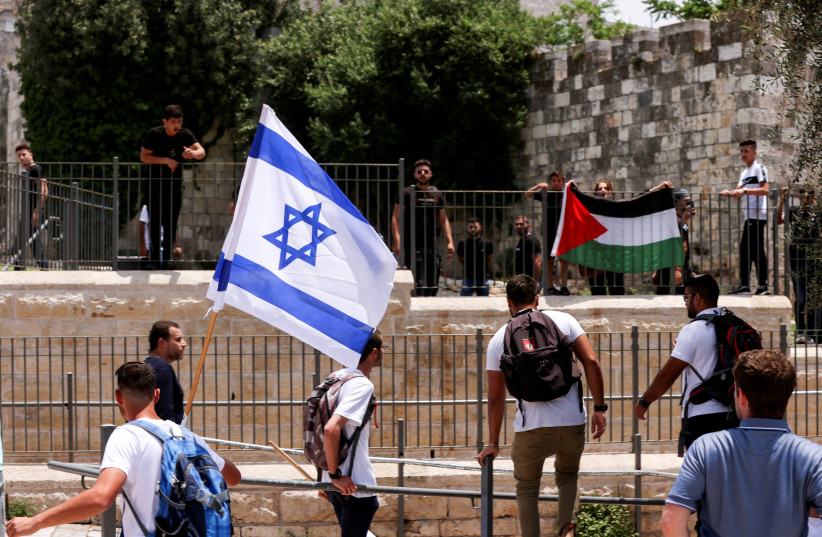At a Knesset Education Committee meeting last week on freedom of expression on campus, Likud MK Keti Shitrit came out against allowing waving of the Palestinian flag.
“Can I walk around in Ramallah with an Israeli flag?” she asked, joining those in the meeting appalled at seeing Palestinian flags waved at various demonstrations around the country over the last several weeks.
“Can I walk around in Ramallah with an Israeli flag?”
Likud MK Keti Shitrit
However, her argument actually had the opposite effect of that which she intended. The fact that everyone realizes that no one could walk around Ramallah waving an Israeli flag shows exactly why Israel should not make a major issue out of people walking around Tel Aviv, Beersheba or even Jerusalem waving a Palestinian one.
Free, democratic Israel is not the undemocratic, un-free Palestinian Authority. The norms and values adopted in the PA are not exactly the norms and values extant in Israel, nor do we want them to be.
Kol ha’aretz degalim, degalim (“The entire nation is replete with flags”), goes the well-known children’s song.

And indeed, that’s the way it has seemed lately, but not in the warm and fuzzy way the song had intended.
Of late, an inordinate amount of time and energy has been spent on flag-related issues: Sunday’s flag march in Jerusalem; last week’s battle of the Israeli vs. Palestinian flags at Ben-Gurion University; Israeli police confiscating Palestinian flags at Arab protests; Arabs ripping down Israeli flags on Independence Day.
And on Wednesday, the flag issue is to make its way to the Knesset, where a bill sponsored by Likud MK Eli Cohen that would ban the display of “enemy flags” at universities and government institutions will come for a reading. Coalition lawmakers were given permission on Sunday to “vote their conscience” on the matter.
One issue with the bill is whether the Palestinian flag should be considered an “enemy flag.”
Don’t we have relations with the PA? Haven’t we signed agreements with it? Don’t we have security coordination with it?
Iran’s flag could be considered an enemy flag, as could Syria’s and – most certainly – Hamas’s flag and the flag of Islamic State. But should the PA’s banner be placed in the same category?
Shitrit said, “[The] PLO flag is an expression of the aspiration to eliminate the State of Israel.” Some may argue, however, that it is an expression of an aspiration of Palestinians to live in a state next to Israel, with Hamas’s banner representing a desire to violently eliminate Israel.
Rather than expending energy on banning enemy flags, the Knesset would do well to spend more energy on measures designed to assert Israeli sovereignty.
Representations of sovereignty
Because when it comes down to it, that is what the flag issue is all about: representations of sovereignty. Jews waving the Israeli flag at Damascus Gate are trying to say that Israel is the sovereign over all Jerusalem. Palestinians waving a Palestinian flag at Jaffa Gate during the funeral of Al Jazeera journalist Shireen Abu Akleh were trying to say Jerusalem is also a Palestinian city.
This is all just symbolic. Granted, symbols are important, but they are not all-important.
If Israel wants to demonstrate real sovereignty in the capital, and not just a symbolic expression of it, how about enforcing the laws, including the municipal building code, throughout the city?
How about ensuring that there is an around-the-clock police presence at the Mount of Olives Jewish Cemetery so that people can visit the graves of loved ones buried there? How about ensuring that Jews can walk safely in all parts of east Jerusalem, just as Arabs can stroll throughout the western part of the city?
And sovereignty, or the lack thereof, is not only a Jerusalem issue. Instead of focusing on a group of Palestinian students demonstrating with Palestinian flags at Ben-Gurion University of the Negev, extend Israeli sovereignty to the roads in the Negev leading to Beersheba where some people are afraid to drive, and give farmers in the region the adequate protection they need to make a living from the land.
A strong, confident country is not spooked or unnerved by someone else’s flag. Israel’s sovereignty is not at risk because of some Palestinian flags. It is at risk, however, in areas where – choosing the path of least resistance – it has opted not to be present.
